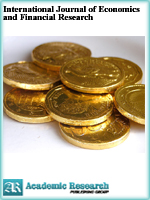International Journal of Economics and Financial Research
Online ISSN: 2411-9407
Print ISSN: 2413-8533
Print ISSN: 2413-8533
Quarterly Published (4 Issues Per Year)

Archives
Volume 1 Number 8 November 2015
Infrastructural Decay in Sub-Saharan Africa: Evidence from the Nigerian Manufacturing Sector
Authors: Ishola R. Akintoye ; Adegbemi Onakoya ; Benita Amos ; Ifayemi M. Olayinka
Pages: 113-122
Abstract
The growth and development of any nation is highly dependent on the level of infrastructure. Infrastructural decay has taken a big toll on the economic development of most Sub- Saharan African nations. This paper investigated the effect infrastructural decay on the growth of the manufacturing sector in Sub- Saharan Africa with particular reference to the Nigerian situation. The data necessary for this study were obtained from secondary sources. The results of unit root suggest that all the variables in the model are stationary. The ordinary least square regression with a coefficient of 0.92 revealed a strong positive relationship between the variables of interest. A co-integration test was performed on these variables to determine the long-run relationship between the variables. The results of causality tests suggest that electricity supply, transport infrastructure and inflation rate (the explanatory variables) jointly explain changes in the manufacturing sector performance. The result also reveals a one-way causation running from interest rate to manufacturing sector performance. The Johansen cointegration result reveals the existence of a common trend among the variables of interest. Electricity decay was found to have the greatest negative impact on the manufacturing sector’s financial performance and output followed by inflation and transportation. The government is therefore enjoined to continue the reform programmes across the infrastructural segments of the economy.
Strategies for Enhancing Student Enrolment in Home Economics Education in Tertiary Institutions in Edo State
Authors: (Mrs) Bridget E. Uwameiye
Pages: 106-112
Abstract
This study examined strategies for enhancing student’s enrollment into Home Economics Education in tertiary institutions in Edo state. The study was a descriptive survey. A total of 21 lecturers participated in the study. No sampling technique was adopted as all the 21 lecturers in the 4 tertiary institutions who lectures Home Economics Education in Edo State were used for the study. Three research questions were raised and answered in the study. A validated questionnaire was used for data collection while the weighted average mean was adopted for data analysis. Findings from the study revealed that there has been dwindling enrollment into Home Economics Education in tertiary institutions in Edo State. Some of the factors responsible for the state of enrolment are negative attitude of parents, poor institutional funding and low awareness of the relevance of Home Economics Education to the students. Strategies if adopted is capable of enhancing the enrolment were; increased funding of tertiary institutions by the government, provision of well equipped laboratories and libraries, creating awareness among parents and students, giving of loans to graduates of Home Economics to aid their business and students should spent longer period in industrial attachment. One of the recommendations proffered was that the existing tertiary institutions offering Home Economics Education should be properly funded by the government.



